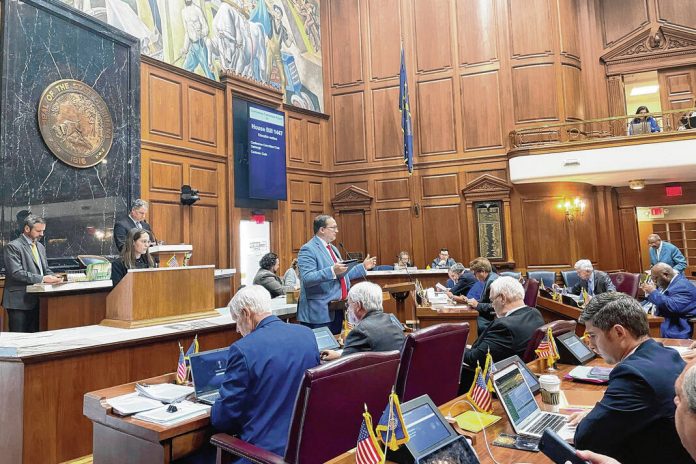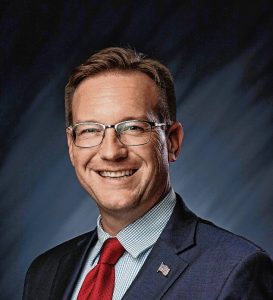
AP Photo/Arleigh Rodgers Indiana Republican Rep. Martin Carbaugh speaks before the House on Thursday, April 27, 2023, at the Indiana Statehouse in Indianapolis. Indiana lawmakers that advanced a state House bill that would remove a legal defense for school libraries if their educators are accused of offering library books harmful to students.
State lawmakers representing parts of Bartholomew County have voted in favor of a proposal that could make it easier for parents and other community members to challenge books in school libraries.
The proposal, HB 1447, would require public and charter school libraries to publicly post a list of books in their catalogs and establish a formal complaint process for parents, guardians and community members who object to materials in the libraries.
Additionally, schools and librarians would no longer be able to argue as a legal defense against criminal prosecution that materials deemed to be “obscene” or “harmful to minors” in their libraries have “educational” value. The proposal, however, would still allow them to argue that the materials have literary, artistic, political or scientific value.
Disseminating material deemed “harmful to a minor,” as well as the sale, distribution or exhibition of obscene material, are Level 6 felonies in Indiana.
The bill cleared the House and Senate on Thursday during the final hours of the legislative session and is now pending before Republican Gov. Eric Holcomb.
The language of the provision was derived from SB 12 that passed the Senate in February and had come up in various other bills this session, The Associated Press reported. It was added Thursday to a House bill related to student assessments and received quick approval from both chambers.
Rep. Ryan Lauer, R-Columbus, and Sen. Greg Walker, R-Columbus, voted in favor of the bill, state records show. Walker also voted in favor of SB 12, according to the vote tally.
 Sen. Greg Walker, R-Columbus
Sen. Greg Walker, R-Columbus
 Rep. Ryan Lauer
Rep. Ryan Lauer
Controversial provision
Supporters of the bill have expressed concern that sexually inappropriate or “pornographic” materials are available to children in school libraries, according to wire reports. Critics, however, said the legislation could open the door to banning books simply because some people don’t like the topics, as well as criminal prosecutions of educators for providing such books, particularly those with LGBTQ+ themes.
Lauer said he supported the bill because it “empowers parents,” “protects children” and allows “parents to have a say in the age-appropriateness of materials.”
“It’s an important piece of legislation that is empowering parents,” Lauer said. “…This bill accomplishes the goals that I’ve supported, that our parents have a say in the materials available to children and when there’s an issue, there is a way for parents to address this and for the schools to be involved. The goal is to protect children and at the same time protect children from predators. It empowers all of our communities to have a say in age-appropriate materials and empowers parents to have a say in what is being taught in our schools.”
When asked about how frequently public schools in Indiana disseminate pornographic or obscene material to students, Lauer wouldn’t cite specific examples, instead pointing to testimony while similar bills were being considered in the past that, in his view, showed that there are “concerns in some communities across the state.”
Walker did not respond to requests seeking comment on why he supported the bill.
The American Civil Liberties Union of Indiana has criticized the bill, saying it would strip away protections for material that is disseminated for educational purposes and would open schools, teachers and librarians up to penalties if a parent disagrees with material available in a school library.
“Just because one person does not want their child to read a book does not give them the right to ban that book for everyone’s children,” Katie Blair, ACLU of Indiana advocacy and public policy director, said in a statement. “Schools should be a thriving ground for freedom of speech and freedom of thought. They should not be turned into a space of control to support a political agenda. As we have seen across the country, when books are censored, it is mostly books by and about LGBTQ people, people of color and other marginalized groups that are the first to be banned. Students have a right to learn about all types of people and histories. This bill will have a chilling effect on the availability of books for students to read and explore.”
Bartholomew Consolidated School Corp. already has a formal process in place for parents and guardians who are concerned about materials available at a school library. It is currently unclear the extent to which the bill would impact that process, if at all, should it become law.
BCSC Superintendent Jim Roberts said Friday that the school corporation was still reviewing the language in the bill, as well as other state legislation that impacts K-12 education.
The initial belief of the school corporation is that language in the bill related to the complaint process “may actually assist with the internal processes we already employ when a challenge is made regarding an existing book in the library,” Roberts said.
However, Roberts expressed some concerns about language in the bill related to Title 35 of the Indiana Code, which deals with criminal law and procedure.
“Our librarians and other related school staff members work diligently to choose books that are age appropriate and of interest to our students,” Roberts said. “With the time spent on social media by our young people, we hope to provide engaging and relevant reading material to engage them. Sen. Walker has reviewed this language in depth and I believe sees it as something that doesn’t really change what may happen with a charge of distributing material harmful to minors based on the interpretation of pornographic and obscene. Realizing that these two terms are often debated, I hope that any changes to Title 35 cannot be used as a weapon against the efforts of our staff members to fully educate our students.”
National trend
The bill comes amid a national wave of Republican-backed legislation seeking to ban books that feature LGBTQ+ subject matter.
Attempted book bans and restrictions on libraries have surged, setting a record in 2022, according to a report released last month by the American Library Association.
More than 1,200 challenges were compiled by the association in 2022, nearly double the then-record total from 2021 and by far the most since the ALA began keeping data 20 years ago.
The report not only documents the growing number of challenges, but also their changing nature, according to wire reports. A few years ago, complaints usually arose with parents and other community members and referred to an individual book. Now, the requests are often for multiple removals, and organized by national groups such as the conservative Moms for Liberty, which has a mission of “unifying, educating and empowering parents to defend their parental rights at all levels of government.”
Last year, more than 2,500 different books were objected to, compared to 1,858 in 2021 and just 566 in 2019.
The ALA bases its findings on media accounts and voluntary reporting from libraries and acknowledges that the numbers might be far higher.
Local efforts
Last year, a group of people from Blessed Life Fellowship, a church in Columbus, attempted to get several books on LGBTQ+ content and sex education material removed from the Bartholomew County Public Library or reshelved in what the church’s leader described as an “age-appropriate section.”
The books included “This Book is Gay” by Juno Dawson, the anthology “Be Gay, Do Comics,” “100 Questions You’d Never Ask Your Parents” by Elisabeth Henderson and Dr. Nancy Armstrong, “Ready for It” by Chusita Fashion Fever, “Doing It” by Hannah Witton and Maia Kobabe’s bestselling memoir “Gender Queer” about sexual identity.
The requests claim that “Gender Queer” is “pornography,” “brainwashing our children,” will “make kids confused about who they are” and that children don’t have the mental capacity to “understand” LBGTQ content, as the “frontal loab (sic) does not develop until twenties.” “Freedom of speech is for adults. Protect Children,” another request to remove the memoir states.
Earlier this year, Eric Grow, a local parent and unsuccessful school board candidate, complied a catalog of books that he said were present in BCSC libraries that he thinks “may be problematic.” As of Feb. 10, the main list contained about 500 titles and includes “To Kill a Mockingbird” and graphic novel adaptations of Anne Frank’s diary and “Brave New World.”
Grow described the list as a project “aimed at improving the resources available in our public-school libraries.”
Grow repeatedly expressed concerns about inappropriate materials in school libraries during the time for public comment at school board meetings. He emphasized his point by reading aloud from a sexually explicit passage he attributed to “A Court of Silver Flames” during one meeting in the spring of 2022.
Waves of efforts to ban books have taken place periodically throughout much of U.S. history, with people often using protecting children as a “smokescreen for other larger issues,” Raymond Haberski, professor of history and director of American studies at IUPUI, who is part of the Center for the Study of Religion and American Studies, told The Republic this past October.
Currently, the LGBTQ community is “in the crosshairs of a particular segment of the Republican right, the far right,” he said.
“I think what is happening is that these books are kind of a stand-in for opposition to entire groups of Americans and how they live their lives,” Haberski said. “Banning these books or having them removed from libraries is simply another way to say that these groups oppose the way people are, their identities. Instead of coming out and being bigoted to people’s faces, they’re going after the books in libraries and saying that those books exist or if my children come across them, somehow, they’re going to be hurt by them, which basically means that they’re saying that children would be hurt by simply living in the same community with people who are not necessarily like them. To me, that is incredibly disturbing.”




